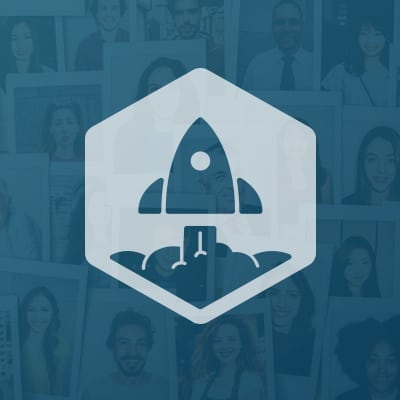Every company’s road to 20,000 customers will look different. What did Intercom’s journey look like and what can we learn from it? How did they end up serving 20,000 customers that aren’t just customers but fans of the product and services? Ilya Fushman, General Partner at Index Ventures, takes the Tactical Stage to interview Eoghan McCabe, CEO of Intercom, on how they did it differently from the competition.
Eoghan discusses how Intercom fosters creativity and where it comes from, how they’ve failed and failed again, never cutting corners on customer support, their hiring and talent strategy, and more.
And if you haven’t heard: SaaStr Annual will be back in 2018, bigger and better than ever! Join 10,000 fellow founders, investors and execs for 3 days of unparalleled networking and epic learnings from SaaS legends like Eric Yuan, Tomasz Tunguz, Chris O’Neill, and Mikkel Svane. If you don’t have tickets, lock in Early Bird pricing today and bring your team from just $999! (All ticket prices go up December 1st.) Get tickets here.
TRANSCRIPT
David Appel: Good afternoon, everybody. My name is David Appel. I’m the head of the software and SaaS vertical at Intacct, the world’s largest independent pure play for cloud ERP. This is our sixth and final session of the tactical stage. I’ve seen some of you in other sessions. It’s great to have you back.
This is going to be a fantastic discussion, two great speakers. What we want you to get out of this session is to understand the trends that are happening in the consumerization of the enterprise. We’ve got two speakers.
Ilya Fushman is a general partner at Index Ventures. He’s got a lot of experience in this space. He, previously before Index, for four years was the head of products at Dropbox, including building Dropbox for Business, so he’s got a lot of insights here.
We’ve got Eoghan McCabe, who’s the co founder and CEO of Intercom. What Intercom is, is let’s see if I can nail the pitch line on it, Eoghan, a communications platform for sales, marketing, and product to all be interconnected in one platform for working around the customer.
Their core message is 20,000 customers have gone with them but they’re not just 20,000 customers. They’re 20,000 fans, based upon what they’ve been able to build with the product.
Allow me to please introduce Ilya and Eoghan.
[applause]
Eoghan McCabe: Thank you.
David: How close was I?
Eoghan: Close ish.
Ilya Fushman: Thank you, David. Hi, everyone. Excited to be here and interview Eoghan, whom I’ve known for about a year, and I’m an excited investor in. I feel like I’ve known him for five, because we spent a lot of time talking about product, go to market, and different things. I had the pleasure of meeting Eoghan about a year ago. I was stalking him for…I don’t even know how long.
I was drawn to Intercom and their approach, because customer communication is really fundamental to how businesses are operating today and built. Intercom has taken a really unique approach in pretty much everything that they’ve done, including the fundraising process.
It felt like I was meeting him for coffee three or four times, and then I just wrote a check. I don’t even think there was even a real pitch in there somewhere. You’ll hear more about that.
Intercom has been on a tear getting to 20,000 customers pretty soon here. I think, Eoghan, first it would be great to hear from you on how did last year go. What did you guys achieve?
Eoghan: Last year I think was our fifth year. It was a pretty big year for us. It was a year where we moved to a new scale. We finished the year at 306 employees, I think, and we started the year at 180 something. That’s quite an amount of change in the organization, a new moment of scale, a new scale that we had to work with.
There was also a new degree of scale with our customers, the amount of customers that we had. We took on some really big projects. We shipped a whole brand new product. That’s one of things that you and I have talked about, that it’s been crazy/silly/idiotic approach that we’ve taken where we built so many damn products.
We also fundamentally reinvented a core part of what we do. We have this little messenger that you can install in your site or your app, and we totally reinvented that. We experienced some pretty crazy revenue growth, finished the year at a number [laughter] we never knew we could reach.
The growth curve puts us amongst some of our heroes, some of the people we look up to. We’re growing as fast as they did, if not faster at our stage. It’s a pretty special year and it sets us up for another interesting one this year, I think.
Ilya: That’s great. I see the Intercom logo and smiley face pretty much every website these days. That’s a lot of serious stuff. Did you get any fun stuff to do last year?
Eoghan: No. The one thing, I think the thing that we joked about is that our probably the biggest milestone was a two and half second feature on HBO Silicon Valley. That was nice. It was like Intercom was in the background of Erlich’s famous speech in the very last episode of the last season. That was a big deal, probably more important than all the other stuff.
Ilya: [laughs] There you go. That’s real validation. Obviously great results, but I think the most interesting thing for folks here is how did you get there because it’s really been, as you said, fairly silly and unconventional in some ways?
You’re a multiproduct company. You started on multiple continents from day one, big founding team. Talk a little bit about product marketing, the business, the people. What have you guys done differently and why did you do it differently from what you’d expect from the norm?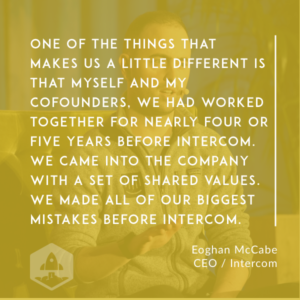
Eoghan: There’s a couple of things behind our approach, and I wouldn’t say it was necessarily super well considered or planned, very well coordinated. It’s been very much an organic thing that has unfolded. One of the things that makes us a little different is that myself, my cofounders, we had worked together for nearly four or five years before Intercom.
We came in at the company with already a set of values or a shared set of understanding. We made all of our biggest mistakes before Intercom.
I feel like on day zero, we had had a ton of practice. A ton of practice. We had had enough opportunities to teach us that some of our initial intuition and our core principles and values were probably pretty useful. The rest of the world is probably just about as dumb as we were. Maybe we should go at it alone and stick to our guns.
We did that at every single turn. There have been, over the years, so many pieces of very smart, specific advice that we’ve received that for whatever reason didn’t land. We didn’t take on board. We went the opposite route. I guess it worked out.
Sticking to our principles and in particular, the principles and values that we developed before we even started the company has been a big deal for us.
Ilya: Talk a little bit about the decision to go from one product monoliths to four, now five, maybe back to four, maybe six.
Eoghan: Maybe back to four. Again, it’s been pretty organic. A lot of the way in which we’ve operated is that we’ve never held anything too dear for too long. If you look at any type of artist, say, recording artist that is successful over a long period of time, they will manage to reinvent themselves, constantly questioning their previously held beliefs.
We’ve done that when it comes to our packaging, our pricing, and the way we’ve presented our products the whole way through. We’re far from got it right. There’s still so much to fix. We started out by building Intercom as this blob of a thing, a set of functionality that was designed to solve a very broad range of problems.
That worked well for a range of smaller companies. As these companies grew and added some sort of structure and sophistication to the way that they worked, we repacked these things, put them in different products, and presented them to the world in a way that we felt they would understand. That’s something that we would speak about pretty abstractly pretty often.
In as much as you need to show the world what the future may look like, you need to come to the world too. Things that are sufficiently out there, or forward thinking, or ahead of their time in some senses can be confusing and crazy enough that they just won’t land.
Always a lot of these changes have been to try and reshape our general vision and set of ideas into a thing that the world would understand. Early on, we even struggled to tell everyone what the hell Intercom was. All of us. Still today, he made a good shot. [laughs]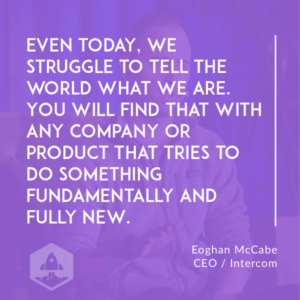
But even today, we struggle to tell the world what we are. You will find that with any company or product that tries to do something fundamentally and fully new. We can talk about this, we won’t. When you start out, you can very much pick a category that you think there remains an opportunity in and reinvent that and change that. That’s where these X for Y companies come from.
We could pick help desk and say, “Let’s build a better help desk.” You could take a fundamentally new and orthogonal approach and do something very, very new.
There’s a cliché where people talk about the biggest opportunities coming from those who invent their own categories. I think that that’s fundamentally true. The tradeoff is that the X for Y type approach where you reinvent an existing category is far more linear, easier to understand, it’s safer, but it has a limited upside because there exist a lot of products there already.
The blue sky, crazy, “We don’t know what this is. Maybe it’s a new category,” approach is really unlikely to work. If it does, the payoff is pretty big because you’re on your own there and you can ride that trend that you create.
The thing that’s important to know about that approach is that anyone who says that that was their strategy is wholly and completely full of shit. You cannot plan that, you cannot architect that. There’s no strategy. You fall into that. It’s that organic process.
That’s why all the way along, we’ve been allergic to this paint by numbers approaches the business because it never felt right and we were excited about this thing and we continue to do this thing. Another way to look at it is to say that we’ve just been super, super lucky that this silly thing that we got excited about happened to be valuable.
Ilya: That’s great. A lot of creativity goes into doing that. Talk a little bit about how do you foster that creativity in your team. To me, when I look at the Intercom product, it’s playful, it’s easy to use, it’s delightful. How do you guys actually make sure that that happens? Is that calculated? Is that just organic?
Eoghan: A lot of that comes from the values that we hold dear in the company and our own motivations for doing this. We would all quit tomorrow if we had to follow any playbook or do anything that you might describe as typical for a software company or SaaS company or an enterprise software company.
We’re in this for pretty creative, maybe dorky, geeky, nerdy endeavors. We want to build cool stuff. That desire for an opportunity to invent and put a new thing into people’s hands and see what they do with it is actually the motivation. Everything else comes after.
Of course, we need to create revenue to sustain that. If we want a company where we get to experiment, to play, and do all these silly things, we have to create revenue, to be able to get money from Ilya, to be able to pay the bills to do silly things yet again.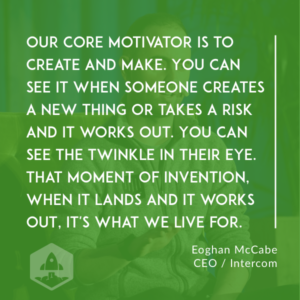
Really, the core motivator is to create and make. That’s where it comes from. It’s that fervor to do cool shit. You can see it when someone creates a new thing or takes a risk and it works out. You can see the twinkle in people’s eye, that moment of invention, when it lands and it works out, it’s what we live for.
To do that well, of course, you need to create a culture where it’s safe to fail and we have a ton of room to improve there too. We’re trying to be playful and innovative while at the same time, we have this crazy high bar and I won’t notice every single mistake. I have to sometimes hold my breath and say, “Well done,” before I say, “You missed a full stop.”
What is really, really important if you want to have a company and a culture where play and invention and innovation is the thing, you need to give people room to make mistakes and you need to tell people that it’s OK when they fail, if not celebrate that failure.
Failure is on the other side of risk and play and endeavour. I would say that in some senses when you’re really experimenting and doing crazy new things, you’ll fail more often than not. When that thing lands and really works out, it can pay off for all the failure many times over.
Ilya: What’s been, if you can talk about it, the most painful failure? What have you killed that you didn’t really want to kill? Maybe you can’t talk about…
Eoghan: No, we totally can. I don’t know how interesting it might be. There’s so much. We failed and fucked up left and right, we’ve built a bunch of stuff we never should have built.
We packaged and presented products to the world that never should have been products, landing pages that were all wrong, experiments that trashed a whole couple quarters of revenue results, hires and mishires, right people in wrong roles, wrong roles with the right people. Everything, all of it. All of it.
There’s actually no interest in one cool…If you gave me heads up, I’d give you a cool little sexy story, but it’s not it. The background to anything that any of us in this room would be excited to do is just a long list of fucking mundane failures. It’s a lot of failure.
Ilya: There you go. Switching gears a little bit, I think marketing is something you guys think about very differently. What’s up with the cartoon characters? Talk a bit about the Intercom marketing where you guys published books about leadership. How does that work?
Eoghan: I guess it’s two pieces there. One is the way we present ourselves, all the silly stuff. The other is the amount we put into branding work. Again, I think that us in the tech world, in general, take ourselves too seriously.
Us in the software world definitely take ourselves too seriously. When we started Intercom, we looked at and we were familiar with what enterprise software looked like. It was a lot of stock photography and high fives and boardrooms and other boring shit.
As creatives and people who are excited to build cool things and have them used and hear what our customers think, our mission and motivation was always more emotional than that and it was less about business and it was more about people.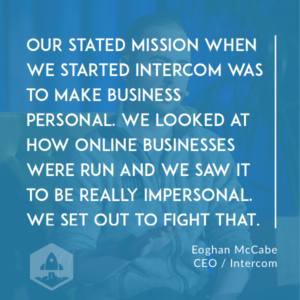
Our stated mission when we started Intercom was to make business personal. We looked at how a business online was run and we saw it to be really impersonal.
For example, the default response to a support inquiry typically would be “Dear valued customer, thanks for your inquiry. You’re ticket number 53. Have you read our FAQ? This ticket will automatically close in 10 days.”
Robotic, impersonal, transactional, spammy, and shit. We set out to fight that in some senses. There’s a lot of heart in that message. “Hey, we want to bring humans back into the equation,” so there was that story to tell.
We also wanted to and continue to want to not take ourselves too seriously, disarm any cynicism. We ourselves can end up being so cynical about a lot of our own shit, corporate stuff, business stuff, so we’re trying in every angle and in every direction to make it fun, friendly, approachable, simple, different.
Content has always been a big part of our brand and here we are and how we work, and I’ll talk about that in just a second. We try to tell our product stories and our company story as stories and we looked at a lot of children’s story books, etc.
A lot of the branding that you see there is intended to tell the story in an emotive way, in a way that doesn’t take us too seriously, as opposed to trying to convey some corporate branding, blah, blah, blah, blah, blah.
I think that makes sense, hopefully. The branding piece is, the content stuff. We were product people from the get go. We knew nothing about sales and marketing. We’re trying to catch up still.
All we knew was passion for the craft and the things that we did and building product and working with customers and getting feedback. A lot of these things were intellectually interesting to us, so almost automatically and without having a strategy, we started to blog a lot.
When I say we, it was really my co founder Des. I’ve written very little on the blog. Over time, what we saw was not that the content created these acquisition opportunities. I think it’s pretty close minded and overly left brained to see content marketing as a way to acquire customers.
What we saw was that our content was an opportunity for us to communicate broadly to the world that we’re here, we care, we might not be idiots, and these are the topics in which you should consider our brand relevant for.
We saw it as this long lead branding opportunity. All of our content you’ll see is never timely. We never comment on news. It’s not clickbait-y. It’s not intended to generate clicks and conversions.
It’s intended to get the message out there, be shared for years. If you look at how our traffic is broken down from all our content, it’s from the hundreds of posts created over the years building up really slowly.
We then started to create books because that’s another format that people could learn from us with. We now have a podcast. We’ve published over 50 podcasts. We have a world tour, which is an opportunity to get in front of people.
All of these endeavors are branding opportunities. That’s something that I have seen companies do too little of. We’re all so focused on growth, conversions, users in the next quarter or the end of the year. We don’t give ourselves an opportunity to think longer term, which in some senses can be easier.
It’s actually really incredibly hard to build a machine that acquires fixed amount of users in a certain time. However, not that hard as to put your soul, your heart, your passion, your brand, and everything you care about into genuine and authentic content and see what would happen with that.
What often will happen with that is a communication of the market that tells them who you are. That’s been massive for us.
Ilya: It’s a little contrary to common thinking though because you want to keep some things for yourself. How do you think about what you communicate out versus what you keep private?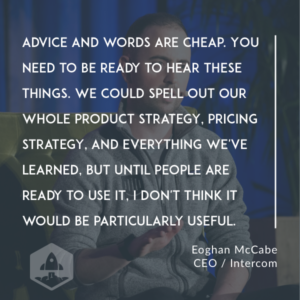
Eoghan: The irony is that advice and words are so cheap. All the advice I’ve heard over the years, most of it, probably didn’t land because I wasn’t ready for it. You need to be ready to hear these things.
We could spell out our whole product strategy, pricing strategy, and everything we’ve learned, but until people are ready to use it, I don’t think it would be particularly useful.
Regardless, it’s well worth us risking that one or two people who might be competitive with Intercom might somehow improve their thinking in return for literally millions of people knowing our brand. It’s a trade off we’ll make all day long.
Ilya: Let’s talk a little bit about business and fundraising specifically. I bet there are a lot of companies here thinking about fundraising. Conventional advice says run a process, talk to a bunch of VCs, line them up, rank them, create a forcing function.
How have you approached it? I certainly gave you a lot of money without that process.
Eoghan: Thank you.
Ilya: How did you do that?
Eoghan: I’ll tell you the brave, maverick, awesome story in a second that makes me look really good. The truth is that I would be shit at running a process. The whole process thing, you have to maintain all these relationships. You pitch all people at the same time, very strategic messaging.
Align them all up in a week, set this deadline where you’re supposed to have turn. I’ve heard what you’re supposed to do. I’m not organized enough for that or have enough patience.
What has happened, and again the whole organic thing, it’s not…If you look at, pick the companies you look up to the most, you’ll see that the greatest things that they have achieved have happened to them by virtue of them existing in the world and maintaining some certain principles. This organic thing, this natural thing, is you’ll see it everywhere.
What ended up happening was that we continued to focus on building amazing products, the best we could do. We tried our very best at product. We spread our message far and wide through our content. Any channel we could find, we tried to put it out there. Customers came to us and investors came to us.
The net effect is that the people who came to us to say, “We love your product. We want to invest,” were the people who were most excited and who naturally understood what the hell we were doing.
If you go and brute force this process on people, you’re going to get a bunch of investors excited maybe for the wrong reasons. If someone like Ilya can read between the lines and say, “Oh, that little messaging in that content, we discovered that on Dropbox, too. That’s interesting that they’re thinking that way. I’ve seen this product around, and actually the people who use the product are the people I look up to.”
You start joining the dots. The people who will join those dots are exactly the type of people I would want to work with. Anyone who came to me who was most interested, they were good to go. They were the people who got it. That’s one piece.
The other piece that needs to be acknowledged, because too easy to set to, we raised $115.75 million. We easily could’ve raised well over 200, perhaps 300, all the way along.
Ilya: There’s still time.
Eoghan: Good. Let’s talk about that. What was I going to say? Shit, it’s totally gone. Don’t make a joke when I’m so close to that fucking perfect…
Ilya: Could have raised…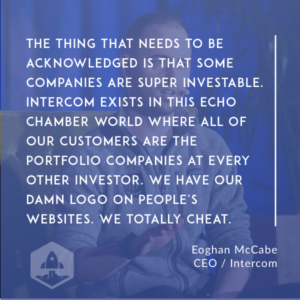
Eoghan: I got it. The point is that the thing that needs to be acknowledged is that some companies are super investable. Intercom exists in this echo chamber world where all of our customers are the portfolio companies at every other investor. We have our damn logo on people’s websites.
We cheat. We totally cheat. If we were building plumber workflow applications, you never would’ve heard of it. The thing that’s really important to recognize there is that, for folks who are not operating like Intercom in this echo chamber-y world, making tech for tech people, raising money is going to be harder.
Don’t be hard on yourself when you see the echo chamber companies boast about how much hundreds of millions of dollars that you raised. That’s real. People need to recognize that.
Ilya: That’s true. You’ve also put the money to use in good ways. You’ve invested a lot in customer support, in people. Talk a bit about that. Why is customer support so important to you first, and then how do you think about building a team, especially trade off between talent and people who don’t know as much but they can grow really quickly?
Eoghan: On the first piece, with customer support, again, our mission was to make internet business personal. We wanted to be always very personal with our customers. We never could sidestep that, or not have good support, if not great support.
We always saw it as an opportunity for very real value add. We never saw it as a cost center, but rather as an opportunity to generate profit. We always would say early on, perhaps a little idealistically, but we continue to talk about this, that any conversation that our customer’s willing to have with us is a privilege, that they would give us their precious time, and they would listen to us, connect with us, and build a relationship with us, even if they’re complaining.
A lot of times when you come across shit software and it upsets you, you might be sufficiently upset or not care such that you’re not going to even bother to talk to the support folks. We appreciate it when they do.
That’s the first thing where we said, “Any time we get to talk to people, it’s a privilege and a pleasure. Let’s use that opportunity. Let’s invest in them, and let’s see that very much as a profit or revenue generating activity. Never try and outsource it or shortchange that whole process and function.”
The other thing that we do is that we very much use customer support and the people in the support team as part of our natural processes. As part of doing your job as a support person is categorizing all of the conversations that we have. We do a lot of this categorization in Intercom. We build little side tools to help us, too.
The support team are responsible for communicating to the rest of the company what our customers care about. We produce this thing called a Customer Voice Report. It comes via the support team.
The support team represent the customers in Intercom in a big way. That’s a way where very tangibly we get a lot of value from them rather than them costing us money and damaging our margin, which too many people think that that’s what they do.
I forgot. You’ve got a second part of that question.
Ilya: Quickly talent, before we get to the future. Talent, how do you think about talent?
Eoghan: Different ways to think about this, but we, as a company, always, I guess are excited about ambitious folks, people early in their career, people who wanted to learn and develop. We always found that there was unique energy that you would get from someone who’s still developing, learning, and growing.
Everyone, no human ever stops growing and learning and developing. It’s an innate part of who we are. Babies want to learn. The oldest people want to learn and grow.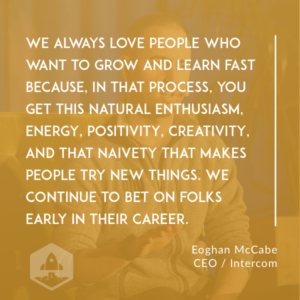
We always love people who wanted to grow and learn fast because, in that process, you get this natural enthusiasm, energy, positivity, creativity, and that naivety that has people try new things. As a company, we continue to bet on folks early in their career, give them shots that maybe other people might not give them.
The same is true in the support team. There’s a ton of folks who, early in their career, have not yet picked a lane. They don’t know maybe where they want to work with, but they’re excited about technology and the prospects for it in the world. They want to get their way in. They want to get their start.
We have also used the support team as an opportunity to bring on very smart ambitious folks, who are able to empathize with, connect with our customers, and help them, give them an opportunity to step into the technology world. We educate them. We, over a period of time, if they ever want to try something else, try and give them those opportunities. That’s the way we think about that.
Ilya: Awesome progress. What’s in the future? 5, 10 years out, where do you want to be?
Eoghan: Big questions. We should talk about this in the next board meeting. Again, our mission is to make business personal. When we look at business online, we see it’s often not personal. It’s spammy. It’s transactional. People treat customers like records in a database and data and statistics. We hate that.
We have a lot more businesses to help. In general, we would love for every business online to use Intercom to talk to their customers. That’s the general broad goal.
If you look at it in a more sober, if not frankly boring, fashion, what Intercom potentially has an opportunity to do, maybe it’s 1 in 1,000 opportunity or far less, is to be that next generation of a customer platform. If you look at what Salesforce is, Salesforce was invented some 16 years ago perhaps.
It was invented almost for pre Internet businesses. It was built or shipped online in some senses, but the people they sold to weren’t digital businesses with users, apps, and all that stuff.
Intercom is for this new generation that wants to deal with customers and users at scale in a new and a personal way, have every team on the same page, and use more modern channels. We look at email. We see email as pretty damn broke, and people don’t read it.
Gmail’s getting really good at putting everything in the promoted tab. Email, it’s fundamentally a broken channel, we believe, and most of these communication products still rely on it. That’s why we use our messenger and other messaging channels.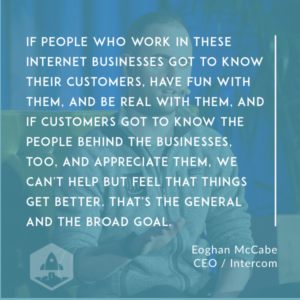
We want to bring that to the world, but we think that there’s maybe a 1 in 1,000 chance, give or take, that over time we could be that next customer platform for all Internet businesses. That’s the modest and humble goal.
We have a small little set of simple products. We need to mature them to help companies who are adding layers of sophistication, if not complexity, work with our product, too. That’s really important.
We’re invested in our platform. We want other people to build on it. We want people to abuse it, use it, take all the data out of it, and put more data in it, too.
Overall, we want to let people have fun with their businesses. There’s a fine line here when I touch on this piece. Very specifically, I’m not trying to say that we’re trying to help make the world a better place. [laughs]
If people who work in these Internet businesses got to know their customers, have fun with them, and be real with them, and if customers got to know the people behind the businesses, too, and appreciate them, we can’t help but feel that things get better. That’s the general and the broad goal.
Ilya: Thank you.
Eoghan: Thank you.
Ilya: It was great. Thanks.

